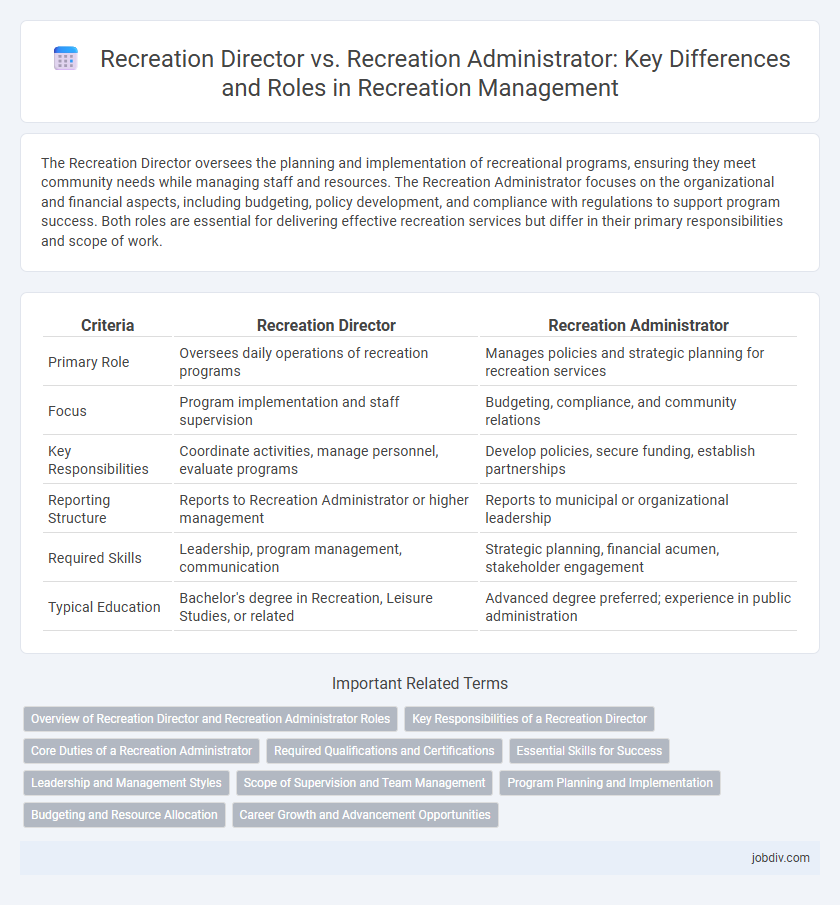The Recreation Director oversees the planning and implementation of recreational programs, ensuring they meet community needs while managing staff and resources. The Recreation Administrator focuses on the organizational and financial aspects, including budgeting, policy development, and compliance with regulations to support program success. Both roles are essential for delivering effective recreation services but differ in their primary responsibilities and scope of work.
Table of Comparison
| Criteria | Recreation Director | Recreation Administrator |
|---|---|---|
| Primary Role | Oversees daily operations of recreation programs | Manages policies and strategic planning for recreation services |
| Focus | Program implementation and staff supervision | Budgeting, compliance, and community relations |
| Key Responsibilities | Coordinate activities, manage personnel, evaluate programs | Develop policies, secure funding, establish partnerships |
| Reporting Structure | Reports to Recreation Administrator or higher management | Reports to municipal or organizational leadership |
| Required Skills | Leadership, program management, communication | Strategic planning, financial acumen, stakeholder engagement |
| Typical Education | Bachelor's degree in Recreation, Leisure Studies, or related | Advanced degree preferred; experience in public administration |
Overview of Recreation Director and Recreation Administrator Roles
A Recreation Director oversees the planning, organization, and execution of recreational programs and activities to meet community needs and enhance participant engagement. A Recreation Administrator manages broader operational functions, including budgeting, policy development, staff supervision, and strategic planning within recreational departments or organizations. Both roles collaborate to ensure efficient program delivery, but the Director focuses on program-level leadership while the Administrator emphasizes organizational management and resource allocation.
Key Responsibilities of a Recreation Director
A Recreation Director is responsible for planning, organizing, and overseeing community programs and recreational activities to enhance public engagement and well-being. They manage staff, budgets, and facility operations while ensuring compliance with safety regulations and organizational policies. Unlike a Recreation Administrator, who focuses more on policy development and high-level administrative tasks, the Recreation Director directly implements programs and interacts with participants to meet community needs.
Core Duties of a Recreation Administrator
A Recreation Administrator oversees the strategic planning, budgeting, and policy development of recreational programs, ensuring compliance with regulatory standards and community needs. They manage staff recruitment, training, and performance evaluations while coordinating with government agencies and stakeholders to secure funding and resources. Their role emphasizes high-level organizational leadership and long-term program sustainability rather than direct program delivery.
Required Qualifications and Certifications
Recreation Directors typically require a bachelor's degree in recreation management, sports science, or a related field, along with certifications such as Certified Park and Recreation Professional (CPRP). Recreation Administrators often need advanced qualifications, including a master's degree in public administration or business management, and certifications like Certified Public Manager (CPM) to oversee complex organizational operations. Both roles emphasize strong leadership skills, but Recreation Administrators focus more on strategic planning and budgeting, making advanced education and management certifications essential.
Essential Skills for Success
Recreation Directors excel in leadership, program development, and community engagement, ensuring activities meet diverse participant needs. Recreation Administrators possess strong organizational, budgeting, and policy management skills crucial for overseeing multiple facilities and staff. Both roles require effective communication and problem-solving abilities to foster safe, inclusive, and enjoyable recreational environments.
Leadership and Management Styles
Recreation Directors emphasize hands-on leadership, directly overseeing program implementation and engaging with staff and participants to ensure quality experiences. Recreation Administrators focus on strategic management, developing policies, managing budgets, and coordinating multiple departments to achieve organizational objectives. Their leadership styles differ as Directors adopt participative and operational management, while Administrators employ visionary and analytical approaches to drive long-term success.
Scope of Supervision and Team Management
A Recreation Director typically oversees the day-to-day operations of recreational programs, directly managing staff, coordinating activities, and ensuring participant engagement within specific facilities or community centers. In contrast, a Recreation Administrator handles broader organizational responsibilities, including strategic planning, budgeting, and supervising multiple Recreation Directors or program managers across various locations. The scope of supervision for Recreation Administrators extends beyond team management to encompass policy development and interdepartmental collaboration.
Program Planning and Implementation
Recreation Directors oversee the development and execution of diverse community programs, ensuring alignment with organizational goals and participant needs. Recreation Administrators focus on strategic program planning, resource allocation, and policy development to support long-term recreational initiatives. Both roles collaborate to optimize program implementation and enhance community engagement in recreational activities.
Budgeting and Resource Allocation
Recreation Directors primarily handle budgeting by developing and managing program-specific budgets to ensure effective allocation of funds for community activities and services. Recreation Administrators oversee broader financial strategies, focusing on resource allocation across multiple departments and long-term fiscal planning to optimize sustainability and operational efficiency. Both roles require expertise in financial management, but Recreation Administrators typically engage with higher-level budgeting decisions and organizational resource distribution.
Career Growth and Advancement Opportunities
Recreation Directors typically manage day-to-day program operations and staff, providing hands-on leadership that can lead to advanced roles in larger organizations or specialized program development. Recreation Administrators oversee broader organizational strategies, budgeting, and policy implementation, positioning them for executive-level careers within municipal or private recreation sectors. Both roles offer distinct career growth opportunities, with Directors gaining practical management experience and Administrators developing high-level administrative and strategic expertise.
Recreation Director vs Recreation Administrator Infographic

 jobdiv.com
jobdiv.com